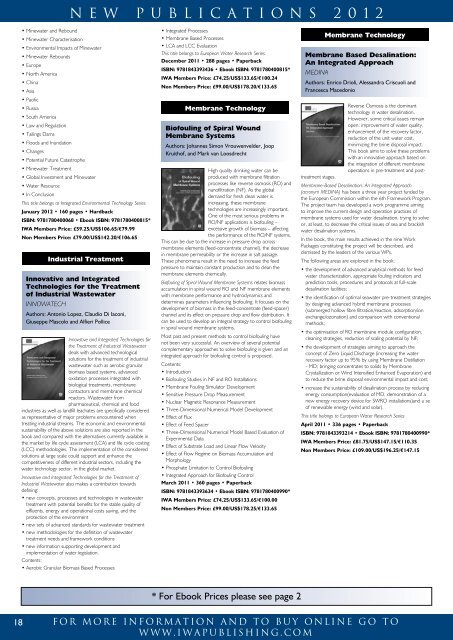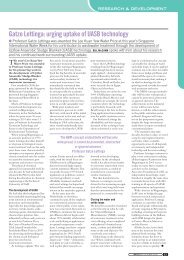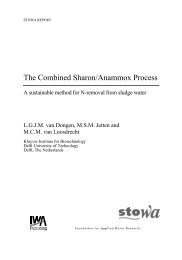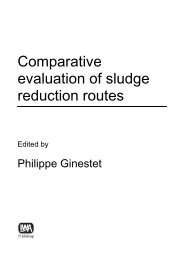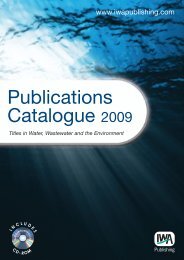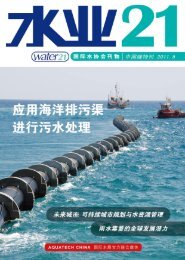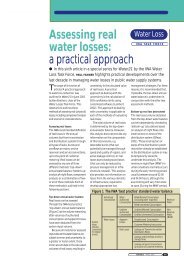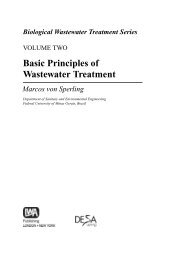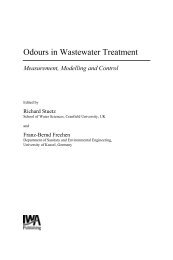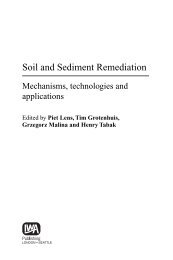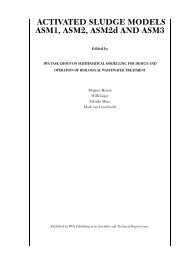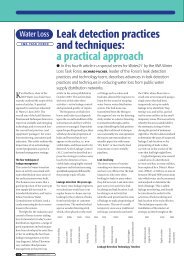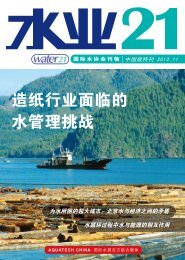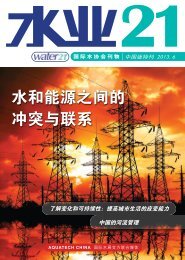PUBLICATIONS CATALOGUE 2012 - IWA Publishing
PUBLICATIONS CATALOGUE 2012 - IWA Publishing
PUBLICATIONS CATALOGUE 2012 - IWA Publishing
You also want an ePaper? Increase the reach of your titles
YUMPU automatically turns print PDFs into web optimized ePapers that Google loves.
N E W P U B L I C A T I O N S 2 0 1 2<br />
• Minewater and Rebound<br />
• Minewater Characterisation<br />
• Environmental Impacts of Minewater<br />
• Minewater Rebounds<br />
• Europe<br />
• North America<br />
• China<br />
• Asia<br />
• Pacific<br />
• Russia<br />
• South America<br />
• Law and Regulation<br />
• Tailings Dams<br />
• Floods and Inundation<br />
• Changes<br />
• Potential Future Catastrophe<br />
• Minewater Treatment<br />
• Global Investment and Minewater<br />
• Water Resource<br />
• In Conclusion<br />
This title belongs to Integrated Environmental Technology Series<br />
January <strong>2012</strong> • 160 pages • Hardback<br />
ISBN: 9781780400068 • Ebook ISBN: 9781780400815*<br />
<strong>IWA</strong> Members Price: £59.25/US$106.65/e79.99<br />
Non Members Price: £79.00/US$142.20/e106.65<br />
Industrial Treatment<br />
Innovative and Integrated<br />
Technologies for the Treatment<br />
of Industrial Wastewater<br />
INNOWATECH<br />
Authors: Antonio Lopez, Claudio Di Iaconi,<br />
Giuseppe Mascolo and Alfieri Pollice<br />
Innovative and Integrated Technologies for<br />
the Treatment of Industrial Wastewater<br />
deals with advanced technological<br />
solutions for the treatment of industrial<br />
wastewater such as aerobic granular<br />
biomass based systems, advanced<br />
oxidation processes integrated with<br />
biological treatments, membrane<br />
contactors and membrane chemical<br />
reactors. Wastewater from<br />
pharmaceutical, chemical and food<br />
industries as well as landfill leachates are specifically considered<br />
as representative of major problems encountered when<br />
treating industrial streams. The economic and environmental<br />
sustainability of the above solutions are also reported in the<br />
book and compared with the alternatives currently available in<br />
the market by life cycle assessment (LCA) and life cycle costing<br />
(LCC) methodologies. The implementation of the considered<br />
solutions at large scale could support and enhance the<br />
competitiveness of different industrial sectors, including the<br />
water technology sector, in the global market.<br />
Innovative and Integrated Technologies for the Treatment of<br />
Industrial Wastewater also makes a contribution towards<br />
defining:<br />
• new concepts, processes and technologies in wastewater<br />
treatment with potential benefits for the stable quality of<br />
effluents, energy and operational costs saving, and the<br />
protection of the environment<br />
• new sets of advanced standards for wastewater treatment<br />
• new methodologies for the definition of wastewater<br />
treatment needs and framework conditions<br />
• new information supporting development and<br />
implementation of water legislation.<br />
Contents:<br />
• Aerobic Granular Biomass Based Processes<br />
• Integrated Processes<br />
• Membrane Based Processes<br />
• LCA and LCC Evaluation<br />
This title belongs to European Water Research Series<br />
December 2011 • 288 pages • Paperback<br />
ISBN: 9781843393436 • Ebook ISBN: 9781780400815*<br />
<strong>IWA</strong> Members Price: £74.25/US$133.65/e100.24<br />
Non Members Price: £99.00/US$178.20/e133.65<br />
Membrane Technology<br />
Biofouling of Spiral Wound<br />
Membrane Systems<br />
Authors: Johannes Simon Vrouwenvelder, Joop<br />
Kruithof, and Mark van Loosdrecht<br />
High quality drinking water can be<br />
produced with membrane filtration<br />
processes like reverse osmosis (RO) and<br />
nanofiltration (NF). As the global<br />
demand for fresh clean water is<br />
increasing, these membrane<br />
technologies are increasingly important.<br />
One of the most serious problems in<br />
RO/NF applications is biofouling –<br />
excessive growth of biomass – affecting<br />
the performance of the RO/NF systems.<br />
This can be due to the increase in pressure drop across<br />
membrane elements (feed-concentrate channel), the decrease<br />
in membrane permeability or the increase in salt passage.<br />
These phenomena result in the need to increase the feed<br />
pressure to maintain constant production and to clean the<br />
membrane elements chemically.<br />
Biofouling of Spiral Wound Membrane Systems relates biomass<br />
accumulation in spiral wound RO and NF membrane elements<br />
with membrane performance and hydrodynamics and<br />
determines parameters influencing biofouling. It focuses on the<br />
development of biomass in the feed-concentrate (feed-spacer)<br />
channel and its effect on pressure drop and flow distribution. It<br />
can be used to develop an integral strategy to control biofouling<br />
in spiral wound membrane systems.<br />
Most past and present methods to control biofouling have<br />
not been very successful. An overview of several potential<br />
complementary approaches to solve biofouling is given and an<br />
integrated approach for biofouling control is proposed.<br />
Contents:<br />
• Introduction<br />
• Biofouling Studies in NF and RO Installations<br />
• Membrane Fouling Simulator Development<br />
• Sensitive Pressure Drop Measurement<br />
• Nuclear Magnetic Resonance Measurement<br />
• Three-Dimensional Numerical Model Development<br />
• Effect of Flux<br />
• Effect of Feed Spacer<br />
• Three-Dimensional Numerical Model Based Evaluation of<br />
Experimental Data<br />
• Effect of Substrate Load and Linear Flow Velocity<br />
• Effect of Flow Regime on Biomass Accumulation and<br />
Morphology<br />
• Phosphate Limitation to Control Biofouling<br />
• Integrated Approach for Biofouling Control<br />
March 2011 • 360 pages • Paperback<br />
ISBN: 9781843393634 • Ebook ISBN: 9781780400990*<br />
<strong>IWA</strong> Members Price: £74.25/US$133.65/e100.00<br />
Non Members Price: £99.00/US$178.25/e133.65<br />
Non Members Price: £99.00/US$178.25/e133.65<br />
Membrane Technology<br />
Membrane Based Desalination:<br />
An Integrated Approach<br />
MEDINA<br />
Authors: Enrico Drioli, Alessandra Criscuoli and<br />
Francesca Macedonio<br />
Reverse Osmosis is the dominant<br />
technology in water desalination.<br />
However, some critical issues remain<br />
open: improvement of water quality,<br />
enhancement of the recovery factor,<br />
reduction of the unit water cost,<br />
minimizing the brine disposal impact.<br />
This book aims to solve these problems<br />
with an innovative approach based on<br />
the integration of different membrane<br />
operations in pre-treatment and posttreatment<br />
stages.<br />
Membrane-Based Desalination: An Integrated Approach<br />
(acronym MEDINA) has been a three year project funded by<br />
the European Commission within the 6th Framework Program.<br />
The project team has developed a work programme aiming<br />
to improve the current design and operation practices of<br />
membrane systems used for water desalination, trying to solve<br />
or, at least, to decrease the critical issues of sea and brackish<br />
water desalination systems.<br />
In the book, the main results achieved in the nine Work<br />
Packages constituting the project will be described, and<br />
dismissed by the leaders of the various WPs.<br />
The following areas are explored in the book:<br />
• the development of advanced analytical methods for feed<br />
water characterization, appropriate fouling indicators and<br />
prediction tools, procedures and protocols at full-scale<br />
desalination facilities;<br />
• the identification of optimal seawater pre-treatment strategies<br />
by designing advanced hybrid membrane processes<br />
(submerged hollow fibre filtration/reaction, adsorption/ion<br />
exchange/ozonation) and comparison with conventional<br />
methods;<br />
• the optimisation of RO membrane module configuration,<br />
cleaning strategies, reduction of scaling potential by NF;<br />
• the development of strategies aiming to approach the<br />
concept of Zero Liquid Discharge (increasing the water<br />
recovery factor up to 95% by using Membrane Distillation<br />
- MD; bringing concentrates to solids by Membrane<br />
Crystallization or Wind Intensified Enhanced Evaporation) and<br />
to reduce the brine disposal environmental impact and cost;<br />
• increase the sustainability of desalination process by reducing<br />
energy consumption(evaluation of MD, demonstration of a<br />
new energy recovery device for SWRO installations)and u se<br />
of renewable energy (wind and solar).<br />
This title belongs to European Water Research Series<br />
April 2011 • 336 pages • Paperback<br />
ISBN: 9781843393214 • Ebook ISBN: 9781780400990*<br />
<strong>IWA</strong> Members Price: £81.75/US$147.15/e110.35<br />
Non Members Price: £109.00/US$196.25/e147.15<br />
* For Ebook Prices please see page 2<br />
18<br />
F o r m o r e i n f o r m a t i o n a n d t o b u y o n l i n e g o t o<br />
w w w . i w a p u b l i s h i n g . c o m


